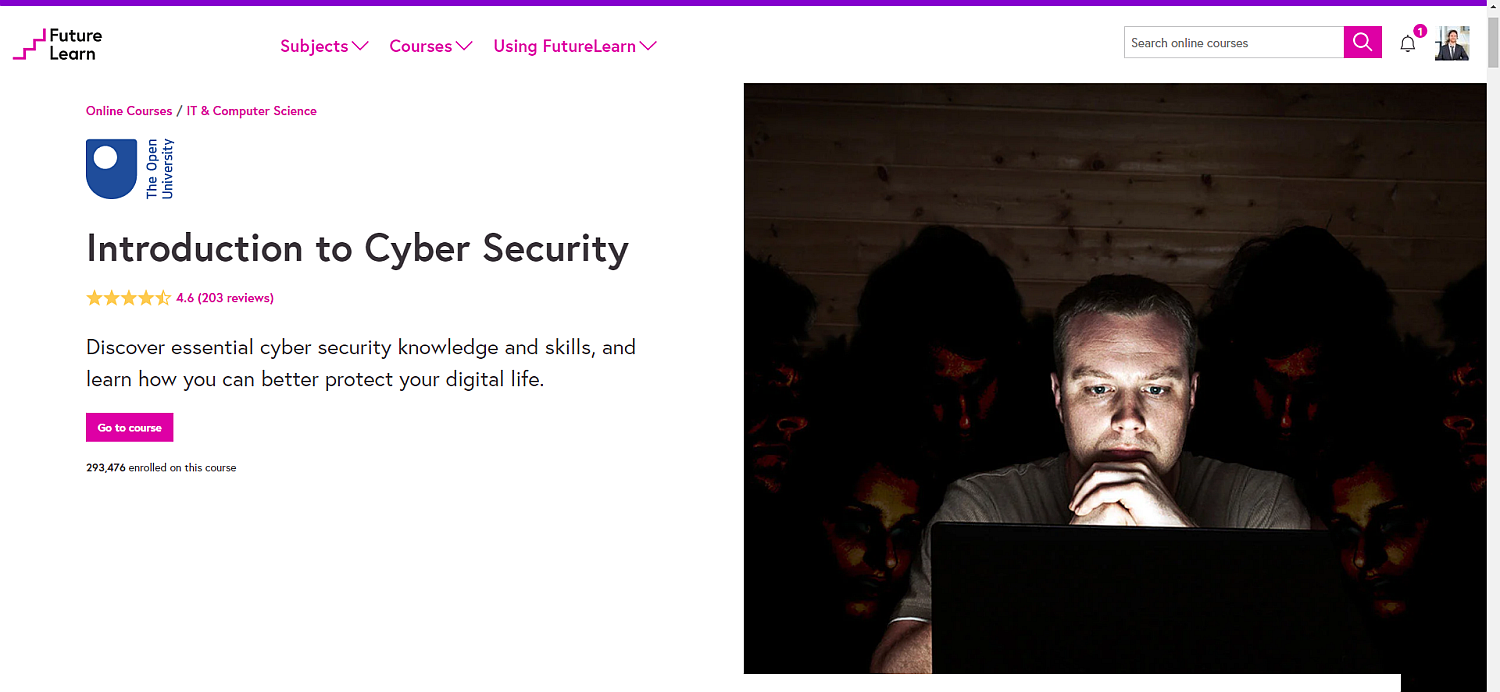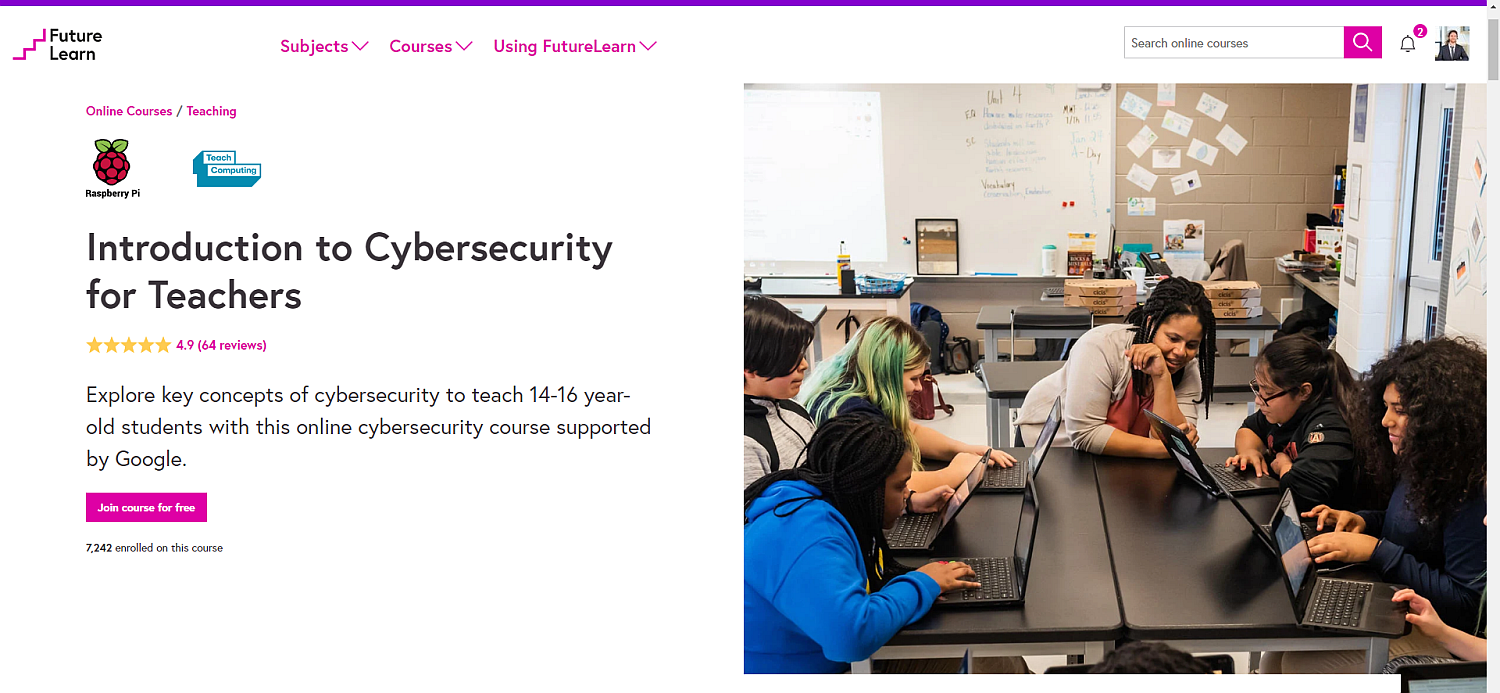Internet safety is massively important. Global news feeds are consistently filled with various data breaches, coming from all manner of international organizations.
So how do you stay safe online? Thankfully, there are heaps of free online courses that will help build your understanding of security and privacy. If you want to learn how to keep safe online, check out these six free online security courses.
1. FutureLearn: Introduction to Cyber Security
The FutureLearn: Introduction to Cyber Security online course aims to give you a basic understanding of cybersecurity principles with a focus on keeping your personal data safe online. The course is also accredited by GCHQ, one of the UK's top intelligence and security organizations.
It is an eight-week online course designed by the UK Government and the Open University. Each week carries a different topic, with Week 1 focusing on the overall threat landscape facing users, Week 3 covering malware, and Week 6 providing an overview of network security.
By the end of the course, you'll have a familiarity with cybersecurity terminology, basic malware types and protections against them, types of cryptography found online, risk analysis and assessment, and more.
Given this is a free course, it provides a decent base level of security understanding, especially for those new to the topic or seeking to understand a little more about staying safe online.
2. Coursera: The Foundations of Cybersecurity
Looking for a short and sharp introduction to cybersecurity fundamentals? The Foundations of Cybersecurity course is a great option, covering key cybersecurity concepts and definitions, common threats to security, types of attacks, and more.
The Foundations of Cybersecurity is a short course, taking just nine hours over a seven-week period. If you prefer, you can sign up for the course and access all of the course material, allowing you to learn at your own pace. Still, it's a good crash course in security basics that could propel you onto more detailed explanations.
3. FutureLearn: Introduction to Cybersecurity for Teachers
This course is designed for teachers who want to convey the importance of online security to their teenage students. So what does that mean for you?
The course itself aims to "improve your students' knowledge of computer security." In that, the course covers topics like protecting yourself online, spotting a social engineering attack, improving your device security, and what malware might look and act like.
It also includes a decent section looking at why physical security is important to digital security, something some other courses skirt over.
Now, this is a course aimed at 14-16-year-old kids. While that makes for some basic explanations of complex security issues, that could be exactly what you need to bulk out your security knowledge and stay safe online.
Furthermore, while basic, the explanations cover enough detail that you'll come away with not only sufficient knowledge to protect yourself online, you might pick up some tips on how to convey that security to friends and family in need of a helping security hand.
4. Coursera: Cybersecurity and Its Ten Domains
The Cybersecurity and Its Ten Domains course is designed as an introduction to the world of cybersecurity, covering the core topic areas and helping to build a solid security foundation.
As you can guess from its name, the course delivers 10 different topics over seven weeks. You'll learn about the fundamentals of online security, data governance, operational security, network security and architecture, and much more.
Although the course syllabus is set out over seven weeks, the total learning time is around 24 hours, working out at around three hours per week. Of course, you can spread your online learning time around to suit your schedule.
5. Heimdal Cyber Security for Beginners
Heimdal Security is one of the fastest rising cybersecurity companies of the past decade, created by two Defcon World Champion hackers. Despite a company name you may not recognize, the Heimdal Cyber Security for Beginners course is a great free introduction to the ins and outs of cybersecurity.
Delivered over a five-week period direct to your email, the course covers cybersecurity basics, the best tools you can use to prevent malware, how to identify security holes in your network, how to protect yourself and your family online, and more.
One of the best things about this course is that it arrives in your inbox. There's no need to jump around platforms and website logins; the course comes to you.
6. Cybrary Information Security Fundamentals
Many free online security courses offer a basic understanding of the essentials. These are excellent options and worth working through to build your security knowledge. But say you've taken one or two of these courses and want to get stuck into something a little more substantial?
When that happens, you turn to Cybrary, one of the best online cybersecurity learning resources. The Cybrary Information Security Fundamentals course covers seven areas integral to protecting yourself online:
- Network Fundamentals
- Data Protection Fundamentals
- Fundamentals of Risk Policies and Security Controls
- Pentest Fundamentals
- Malware Fundamentals
- Mobile Security Fundamentals
- Password Cracking Tool Fundamentals
Seems like a lot for a basic course? The Cybrary is a true learning library that you can use to launch a cybersecurity career or build a much greater knowledge of all internet users' issues.
As such, it does take a bit longer to complete. The recommended completion time is around one month, studying for around three hours per day. But that's if you're working to a strict schedule for completion. You can sign up for the course and complete it at your leisure.
What Is the Best Free Online Security Course?
The best free security course could be any one of the options above. Each one of these free cybersecurity classes will deliver enough of a basic understanding of online security, personal security, and data protection practices that you should always remain as secure as possible.
Even if you're not considering a career in cybersecurity, you need to understand how online security works. Considering how many sites and services require an online presence, building your cybersecurity knowledge is never a bad thing.



